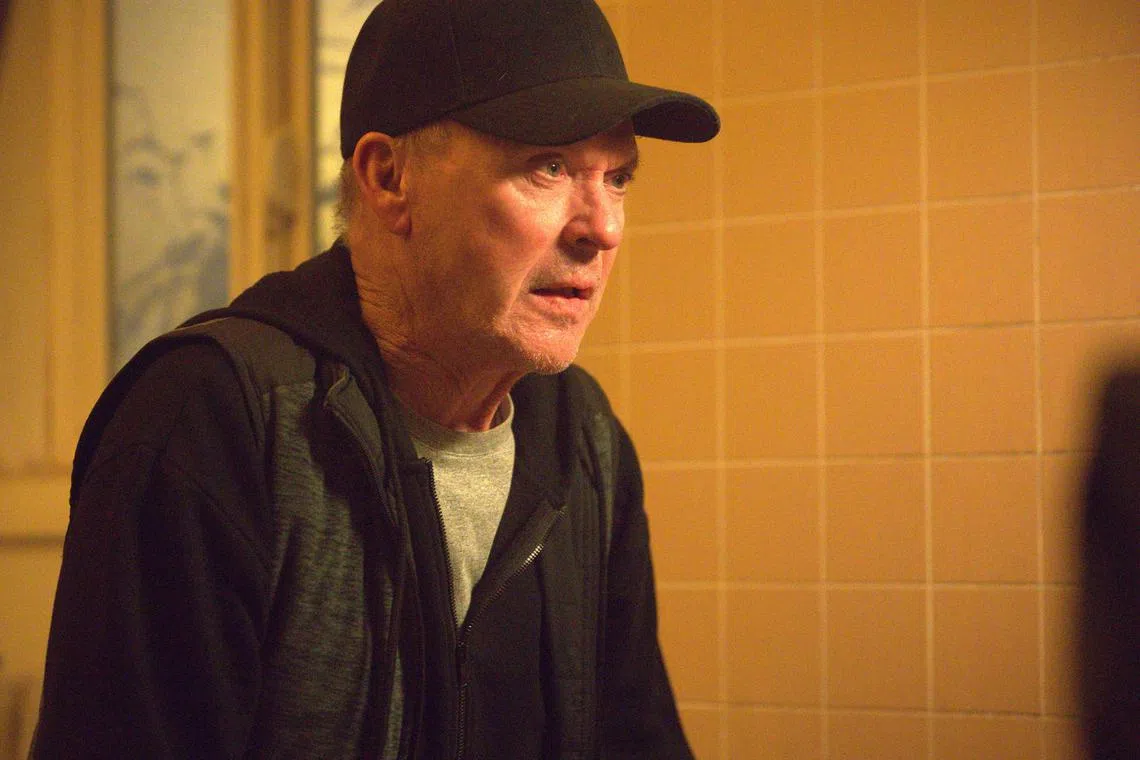At The Movies: Cannes-winning Black Dog a thoughtful study, Michael Keaton lifts Knox Goes Away
Sign up now: Get ST's newsletters delivered to your inbox

Eddie Peng's character in Black Dog forms a bond with a particularly spirited canine.
PHOTO: THE PROJECTOR
Follow topic:
Black Dog (PG13)
110 minutes, opens exclusively at The Projector on July 25
4 stars
The story: Former convict Lang (Eddie Peng), a stunt motorcyclist, returns to his home town, a dusty spot on the edge of the Gobi Desert. Shuttered businesses and empty homes are mostly what he finds, because the mining operation which was once the town’s main activity has shut down. Feral packs of dogs, abandoned by former residents, roam the streets. With the 2008 Beijing Olympics around the corner, the government launches a stray-clearing campaign. Lang joins his town’s dog-catching team, but finds kinship with one particularly spirited canine. Directed and co-written by Chinese film-maker Guan Hu, Black Dog won the Un Certain Regard prize at the 2024 Cannes Film Festival.
Peng’s nearly-mute Lang walks through the film, a stubbornly passive figure who becomes anything that those who cross his path want him to be.
He accepts being punished by gangsters for past sins just as he welcomes praise from townsfolk, who hold affection for him for some reason. He cannot leave, as a condition of his release is that he remains within city limits.
In that respect, Lang’s story will remind viewers of Clint Eastwood’s westerns, in particular Pale Rider (1985), in which Eastwood plays a man with no name, riding into a dusty locale with no future and against his will, and becomes the focus of the townsfolk’s hope as well as their hatred.
Director and co-writer Guan Hu is labelled a member of the “sixth generation”, the group of post-1990s low-budget indie creators that includes Wang Xiaoshuai (So Long, My Son, 2019) and Jia Zhangke (Still Life, 2006, winner of the Golden Lion at the Venice Film Festival).
Jia, not by coincidence, plays Uncle Yao, the morally compromised leader of Lang’s dog-catching team.
Everything looks absurd from Lang’s point of view, which is the view that the film sympathises with. The loner finds neither joy nor meaning in anything. Some view him as a man without purpose, when he tries to make it clear that he is fine without one. However, the police, his enemies, family and even a passing circus contrive to ensnare him in their plans.
These plans, whether they come from the government as part of its pre-Beijing Olympics drive or from local tycoons keen on extracting their pound of flesh, feel like trivialities against the desert. Guan frames nature as timeless, all-encompassing and beautiful.
Lang’s journey takes a turn when he finds the abandoned dog of the film’s title, a creature with a will as strong as his own. Taiwanese actor Peng’s agility as an actor is apparent. Lang, the stone-faced stoic, is capable of floods of emotion after his heart is broken.
Guan’s days as an outsider film-maker looked to be numbered when he signed up to direct mass-market movies, such as the patriotic anthology My People, My Country (2019) and war biopic The Eight Hundred (2020). Both were solid works of entertainment. But with Black Dog, he seems to have come back to his indie roots in great style.
Hot take: Beautifully shot and thoughtful study of a man, his dog and the desert.
Knox Goes Away (NC16)
115 minutes, opens on July 25
3 stars

Michael Keaton plays a contract killer who is diagnosed with degenerative dementia in Knox Goes Away.
PHOTO: SHAW ORGANISATION
The story: Hollywood veteran Michael Keaton pulls double duty, directing an American neo-noir and starring as a contract killer, John Knox, who is diagnosed with degenerative dementia.
Keaton, despite a prodigious acting range from Batman (1989) to Birdman (2014), also cast himself as a troubled assassin in his 2008 directorial debut, The Merry Gentleman. Make of that what you will.
Knox Goes Away begins with the titular anti-hero’s botched final job, where, in his worsening brain fog, he leaves three bodies instead of just the target.
A dogged police detective (Suzy Nakamura) is already connecting him to the triple homicide when his estranged adult son (James Marsden) visits that night, desperate for help to cover up his own violent crime: He stabbed his teen daughter’s sleazebag lover.
Knox does not need this further complication.
Neither does the story, because the subplot is convoluted and sentimental about family atonement.
Knox is a Gulf War veteran with PhDs in English and history, and the dramatic thriller succeeds well enough as a character study of a coldly intellectual executioner’s aggressive mental decline: of his seven weeks racing against his prognosis, as well as the authorities, to settle his affairs and cash out.
Al Pacino has the dandy supporting role of his retired master thief mentor-confidant, who takes his calls while eating Chinese delivery and drinking wine in a bubble bath.
Soon, though, Knox will remember neither him nor the Eastern European escort (Joanna Kulig) he trysts with every Thursday afternoon.
He loses his memory, his faculties, then himself. Keaton is an actor of twitchy alertness, his performance here hence all the more affecting.
Hot take: Keaton is ever watchable, however variable the movie.

